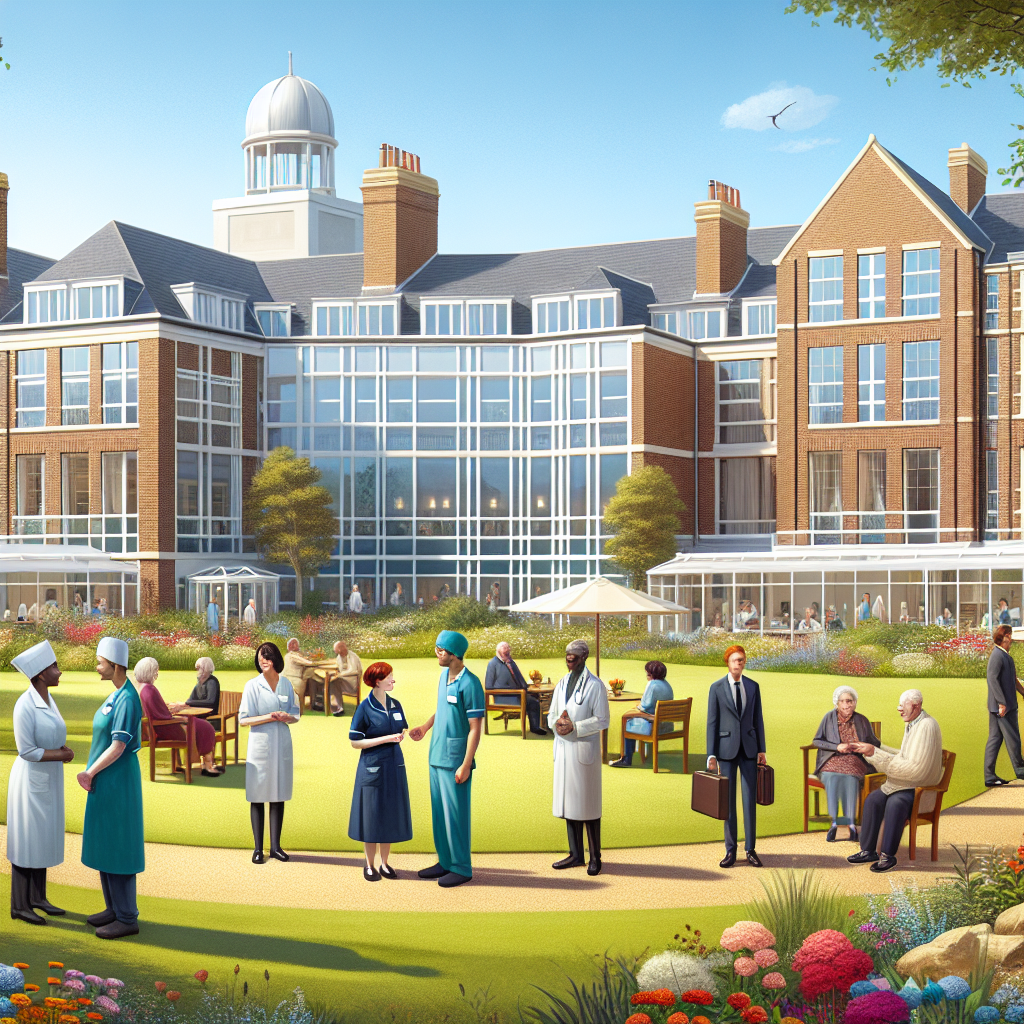-
Table of Contents

“Reclaim Your Life: Comprehensive Heroin Rehab in London”
Introduction
Heroin rehab in London offers a comprehensive and structured approach to overcoming addiction, combining medical, psychological, and social support to facilitate recovery. Patients can expect a thorough assessment upon entry to tailor a personalized treatment plan, which typically includes medically supervised detoxification to manage withdrawal symptoms safely. The rehab process often incorporates individual and group therapy sessions, cognitive-behavioral therapy (CBT), and holistic treatments such as mindfulness and exercise programs to address the underlying causes of addiction and promote overall well-being. Additionally, patients receive education on relapse prevention and coping strategies to maintain long-term sobriety. Support extends beyond the initial treatment phase, with aftercare programs and resources to help individuals reintegrate into society and sustain their recovery journey.
Comprehensive Treatment Approaches in London Heroin Rehab Centers
When embarking on the journey to overcome heroin addiction, choosing the right rehab center is crucial. In London, heroin rehab centers offer comprehensive treatment approaches designed to address the multifaceted nature of addiction. These centers provide a blend of medical, psychological, and holistic therapies, ensuring that each individual receives a tailored treatment plan that caters to their unique needs. The first step in this transformative journey often begins with a thorough assessment. This initial evaluation helps clinicians understand the severity of the addiction, any co-occurring mental health disorders, and the individual’s overall physical health. By gaining a comprehensive understanding of the patient’s condition, the rehab center can develop a personalized treatment plan that maximizes the chances of successful recovery.
Detoxification is typically the next phase in the treatment process. In London rehab centers, detox is conducted under the supervision of medical professionals who can manage withdrawal symptoms and provide medications if necessary. This medically supervised detox ensures that patients are safe and as comfortable as possible during this challenging phase. The goal is to cleanse the body of heroin and other toxins, laying a solid foundation for the subsequent stages of treatment. Following detox, patients engage in various therapeutic interventions. Cognitive-behavioral therapy (CBT) is a cornerstone of addiction treatment in London rehab centers. CBT helps individuals identify and change negative thought patterns and behaviors associated with their addiction. By developing healthier coping mechanisms, patients can better manage triggers and reduce the risk of relapse.
In addition to CBT, many London rehab centers incorporate other evidence-based therapies such as dialectical behavior therapy (DBT), motivational interviewing, and contingency management. These therapies work synergistically to address the psychological aspects of addiction, helping patients build resilience and a stronger sense of self-efficacy. Group therapy is another integral component of the treatment process. Sharing experiences with others who are on a similar journey fosters a sense of community and support. It helps individuals realize that they are not alone in their struggles and that recovery is possible. Group therapy sessions are often facilitated by experienced therapists who guide discussions and ensure a safe, non-judgmental environment.
Holistic therapies also play a significant role in the comprehensive treatment approaches offered by London rehab centers. Practices such as yoga, meditation, art therapy, and acupuncture are integrated into treatment plans to promote overall well-being. These therapies help individuals reconnect with their bodies and minds, reduce stress, and enhance emotional regulation. Nutrition and physical fitness are also emphasized, as a healthy body supports a healthy mind. Patients receive guidance on balanced diets and engage in physical activities that improve their physical health and boost their mood.
Family involvement is another critical aspect of heroin rehab in London. Many centers offer family therapy sessions to help repair relationships that may have been strained by addiction. Educating family members about addiction and recovery can create a more supportive home environment, which is essential for long-term success. Aftercare planning is the final, yet equally important, phase of the treatment process. London rehab centers understand that recovery is a lifelong journey, and they provide robust aftercare programs to support individuals as they transition back into their daily lives. This may include ongoing therapy, support group meetings, and access to resources that help maintain sobriety.
In conclusion, heroin rehab centers in London offer comprehensive treatment approaches that address the physical, psychological, and emotional aspects of addiction. Through a combination of medical supervision, evidence-based therapies, holistic practices, and family involvement, these centers provide a supportive and nurturing environment for individuals seeking to reclaim their lives from heroin addiction. The journey may be challenging, but with the right support and determination, recovery is within reach.
Life After Heroin Rehab: What to Expect in London
Life after heroin rehab in London can be a transformative journey, filled with both challenges and opportunities. As individuals emerge from the structured environment of a rehabilitation center, they often find themselves navigating a new world of possibilities and responsibilities. The transition from rehab to everyday life is a critical phase, and understanding what to expect can help ease this process and set the stage for long-term recovery.
One of the first things to anticipate is the importance of aftercare programs. These programs are designed to provide ongoing support and guidance, helping individuals maintain their sobriety and build a stable life. In London, aftercare services are abundant and varied, ranging from outpatient counseling and support groups to sober living homes. Engaging with these resources can be instrumental in preventing relapse and fostering a sense of community and accountability.
Moreover, reconnecting with family and friends is another significant aspect of life after rehab. Relationships may have been strained or damaged due to the addiction, but rehab often includes family therapy sessions aimed at mending these bonds. Rebuilding trust and communication with loved ones can provide a strong support network, which is crucial for sustained recovery. It is essential to approach these relationships with patience and openness, understanding that healing takes time.
In addition to personal relationships, finding meaningful activities and setting new goals are vital components of post-rehab life. Many individuals discover new passions or rekindle old interests that were neglected during their addiction. Whether it’s pursuing education, starting a new career, or engaging in hobbies, these activities can provide a sense of purpose and fulfillment. London offers a plethora of opportunities in this regard, from educational institutions and vocational training programs to cultural and recreational activities.
Another key element to consider is the importance of maintaining a healthy lifestyle. Physical health often deteriorates during addiction, and recovery provides an opportunity to restore and enhance well-being. Regular exercise, a balanced diet, and adequate sleep are fundamental to physical and mental health. London’s numerous parks, gyms, and wellness centers offer ample opportunities to stay active and healthy. Additionally, mindfulness practices such as yoga and meditation can be beneficial in managing stress and promoting emotional stability.
Financial stability is also a crucial factor in life after rehab. Addiction can lead to financial difficulties, and rebuilding one’s financial health is an important step towards independence and security. This may involve finding employment, managing debts, and learning budgeting skills. London’s job market is diverse, and there are various organizations and programs dedicated to helping individuals in recovery find employment and achieve financial stability.
Lastly, it is important to recognize that recovery is an ongoing process. There will be ups and downs, and setbacks are a natural part of the journey. Developing resilience and coping strategies is essential for navigating these challenges. Support groups, such as Narcotics Anonymous, provide a platform for sharing experiences and gaining strength from others who understand the struggles of addiction and recovery.
In conclusion, life after heroin rehab in London is a multifaceted journey that involves rebuilding relationships, finding new passions, maintaining a healthy lifestyle, achieving financial stability, and developing resilience. With the right support and resources, individuals can create a fulfilling and sober life, turning their recovery into a story of hope and transformation.
Q&A
1. What types of therapies are commonly used in heroin rehab in London?
– Common therapies include cognitive-behavioral therapy (CBT), group therapy, individual counseling, and sometimes holistic therapies like yoga and meditation.
2. How long does a typical heroin rehab program last in London?
– A typical heroin rehab program in London can last anywhere from 28 days to several months, depending on the severity of the addiction and the specific needs of the individual.
Conclusion
Heroin rehab in London typically offers a comprehensive approach to recovery, including medically supervised detoxification, individualized therapy, group counseling, and aftercare planning. Patients can expect a structured environment with professional support aimed at addressing both the physical and psychological aspects of addiction. The goal is to equip individuals with the tools and strategies needed for long-term sobriety and reintegration into society.



